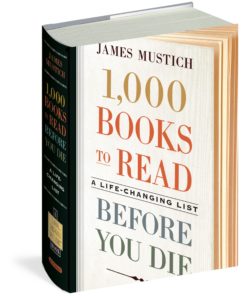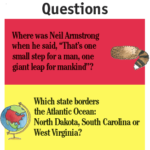A note from the author, James Mustich…
In the Company of Books
Once people know you are writing a book called 1,000 Books to Read Before You Die, you can never enjoy a dinner party in quite the way you did before. No matter how many books you’ve managed to consider, and no matter how many pages you’ve written, every conversation with a fellow reader is almost sure to provide new titles to seek out, or, more worryingly, to expose an egregious omission or a gap in your knowledge—to say nothing of revealing the privileges and prejudices, however unwitting, underlying your points of reference.
Keeping such diversity of appetite in mind, and hoping to have something to satisfy every kind of reading yen, I wanted to make 1,000 Books to Read Before You Die expansive in its tastes, encompassing revered classics and commercial favorites, flights of escapist entertainment and enlightening works of erudition.
There had to be room for novels of imaginative reach and histories with intellectual grasp. And since the project in its title invoked a lifetime, there had to be room for books for children and adolescents. What criteria could I apply to accommodate such a menagerie, to give plausibility to the idea that Where the Wild Things Are belongs in the same collection as In Search of Lost Time, that Aeneas and Sherlock Holmes could be companions, that a persuasive collection could begin, in chronological terms, with The Epic of Gilgamesh, inscribed on Babylonian tablets more than four thousand years ago, and end with Ellen Ullman’s personal history of technology, Life in Code, published in 2017?
I came upon the clue I needed in a passage written by the critic Edmund Wilson, describing “the miscellaneous learning of the bookstore, unorganized by any larger purpose, the undisciplined undirected curiosity of the indolent lover of reading.” There, I knew instinctively, was a workable conceit: What if I had a bookstore that could hold only 1,000 volumes, and I wanted to ensure it held not only books for all time but also books for the moment, books to be savored or devoured in a night? A shop where any reading inclination— be it for thrillers or theology, or theological thrillers—might find reward. In the end, I was back in my favorite haunt, a browser’s version of paradise.
That end, of course, was only the beginning. I still had to wrangle with myriad knotty concerns. I spent months—was it years?—arranging and rearranging lists of several thousand titles. What classics were compelling enough to earn a spot? Which kids’ books so timeless they made the grade? What currents of thought retained their currency? Which life stories were larger than their protagonist’s life span? Not least, what authors did I love so much that they might be ushered in without their credentials being subject to too much scrutiny?
My answers to all the above questions almost certainly will not be yours. Even where we agree, my description of a book might not highlight the things that have made you love it. A text is never static: Every sentence wends its way into the ear and mind of one reader differently than it is welcomed, or invites itself, into those of another. Just as a musician brings a score to life, so a reader animates an author’s pages; as Emerson said, “‘Tis the good reader that makes the good book.” And true readers talk and listen to one another, recommend and contend, make lists in the service of their search for another volume; it’s all part of the dance of serendipity and conversation that sweeps up all genuine book lovers time and again.
 More About 1000 Books to Read Before You Die:
More About 1000 Books to Read Before You Die:
It’s time to talk books—and the conversation starts here.
Encompassing fiction, poetry, science and science fiction, memoir, travel writing, biography, children’s books, history, and more, 1,000 Books to Read Before You Die moves across cultures and through time to present an eclectic collection of titles, each described with the special enthusiasm readers summon when recommending a book to a friend.
The book’s alphabetical listing by last name results in the serendipity of juxtaposition—Cormac McCarthy’s The Road next to Robert McCloskey’s Make Way for Ducklings, John le Carré next to Ursula K. Le Guin next to Harper Lee. Following each entry are rich endnotes that include publication dates and preferred editions, other books by the same author, related books to try, and listings of worthy adaptations, including movies and audiobooks. In total, more than six thousand titles by thirty-five hundred authors are recommended.
An insightfully curated personal compendium that will inspire hours of browsing and a lifetime of reading, 1,000 Books to Read Before You Die celebrates the gorgeous mosaic that is our literary heritage.
Buy the Book
Amazon | B&N | Indiebound | Workman
*Author note has been adapted from 1000 Books to Read Before You Die.





No Comments